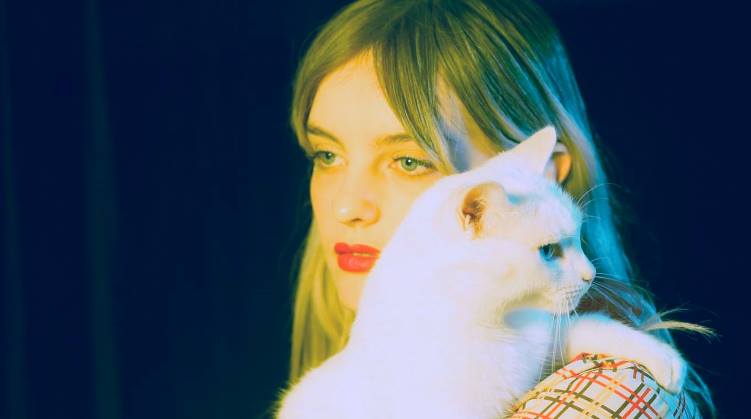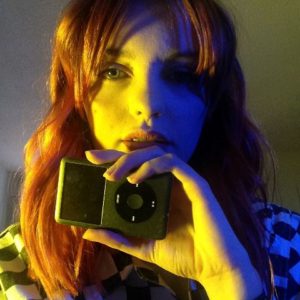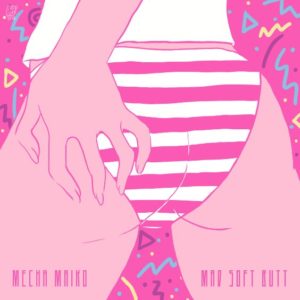
From the accomplished Canadian duo DEAD ASTRONAUTS, Hayley Stewart makes a swift departing move and goes off to create her own sweet music under the pseudonym of MECHA MAIKO.
Many acts debut in a clumsy, trial and error way but not her! The synthpop anime lady enters the world of electronica with one of the strongest firsts that the synth world has experienced in a while. The wonderful ‘Mad But Soft’ blows many out of the electronic “sea of sin”, and it’s all done with nonchalance and femininity without being too sickly sweet.
ELECTRICITYCLUB.CO.UK caught up with the Toronto based Geisha-esque creature to talk pop and what makes good girls write bad ass music…
Of course, you’re not a completely new artist as you did two albums in DEAD ASTRONAUTS with Jared Nickerson? How was that period?
Oh yeah, we did a number of releases! That was my first time ever being in a “real” band. I was eighteen when we started and it was a very exciting collaborative effort. We both were building things from scratch, and I was fortunate that Jared had a lot of freelance experience and a number of contacts in the design industry (he is a great illustrator / designer himself) so he already had a lot of the branding and imagery for the band sorted out already.
It was great to have someone to hold you accountable – you work harder to satisfy one another and establish an open dialogue of feedback and criticism. The early days of DEAD ASTRONAUTS was probably when I worked the hardest because I had to now take my production skills just as seriously (if not more) as my vocal skills, and be open to changing a song dozens of times over until it sat right for the both of us.

How and why were you inspired to do a project outside of DEAD ASTRONAUTS?
As I mentioned, DEAD ASTRONAUTS was established with a particular vibe, and the music ideas I brought forth were curated to fit into that established image. I would often start songs that I’d be super excited about, but just wouldn’t work for what DEAD ASTRONAUTS was – it would be weird to have a song with lyrics like in ‘Contract’ appear on an album like ‘Constellations’. It didn’t fit into the DEAD ASTRONAUTS universe which was much more painted in tragedy and often depicted futuristic cosmic landscapes.
I wanted to give myself a platform to put all these tracks without compromise – sometimes you just get an attachment to something that you can’t bring yourself to change. So, in that way, MECHA MAIKO started from a graveyard of songs that I wanted to resurrect, or that I otherwise stubbornly held onto for myself, ha ha!
What decided the musical direction of ‘Mad But Soft’?
The musical direction I took with the album almost felt haphazard. I’d like to say everything was conceptualized beforehand and realized as a full work of art, but I had so many songs on the go that I had to narrow them down and decide as I went. I wanted the album to hold onto many of the retro elements I enjoy using, but also experiment with sounds that don’t have a distinct tie to a particular genre. For better or worse, I tend to work on songs without visualizing their place in a finished piece, so it was more about putting them together in a way that felt bright and poppy but also a little bit dark and off-beat.
So “Turning Japanese” isn’t a bad thing after all…
Was it ever? – Wait. Don’t answer that! There has been a myriad of problems with Western culture fetishizing and appropriating the East.
As a white Canadian girl drawing on Japanese culture for my name and surrounding mythos, I try to do my research so I can feel comfortable when borrowing from it.

Have you always taken the inspiration from Japanese culture and been a “shinnichi”?
During my formative years, I was particularly impacted by Japanese culture, at first very naively through anime and video games. My favorite game was set in Tokyo, and after learning my childhood best friend was going to move there, I researched Japan like crazy and fell in love with the landscapes, traditions, music, and street fashion – it was unlike anything I saw growing up in the suburbs.
When I was around 11 or 12, I started taking sewing lessons because I was so inspired by the street fashion that I saw on japanesestreets.com and scans of Fruits magazine posted on Livejournal. When I was 13, I actually got the chance to go visit my friend there. It was a dream come true but it was also very sobering, where many of the assumptions I had were shattered.
On my first day, we walked through Akasaka and saw a big truck covered in posters and men with signs and megaphones yelling in protest outside a building. “What’s that all about?” I asked my friend; “They’re protesting the foreigners in the country” she replied, “They say anyone who isn’t Japanese should be kicked out. I see them there all the time” – suddenly I learned it was like any other place, wrought with its own set of political and social issues.
I would learn and experience many other things that would make me reassess my vision of Japan as a quirky utopia ready to take me in as one of their own. I felt guilty for coming, although I was barely able to speak enough Japanese to order something to eat.
After that, my obsession with Japan took a less fantastic approach. Lately I’ve been interested in learning more about its fashion and art history and how political and religious influence often had an explicit role in shaping it.

The album is feminine but marvellously strong…
I appreciate that. I’ve noticed lately that I make my voice softer than it really is, to sing a little more quietly so that it sounds more intimate and airy, which usually reads as feminine, almost submissive. The lyrics – and some production elements – by contrast, are more assertive and rousing. Both guest vocal performances on the album, too, are set against very pleasing melodies but evoke a sort of “knowing” and self-assuredness.
The huge success of ‘Stranger Things’ and its soundtrack seems to have paved the way for looking retrospectively to the quintessential synth era…
Definitely. I think ‘Drive’ was a major gateway for large audiences into synthwave and ‘Stranger Things’ is very much the second wave, although it doesn’t really delve into pop in the same way, focusing more on the Carpenter-ian use of synths in film / TV scores, it does evoke that same feeling of “damn, why did we ever stop using this sound?” I was a big fan of SURVIVE’s ‘mnq026’ release so I’m happy that they landed such a great gig producing the score for ‘Stranger Things’.
A well-written pop song can make it anywhere, the album is full of those!
I’m happy you think so! I’ve noticed that small radio stations and DJs have been playing my tracks alongside a wide variety of other artists and genres that I have rarely been associated with, so it’s fascinating to see how it fits in amongst others’ musical palates. I’ve found there are plenty of metalheads and darksynth listeners that jam out to ‘Mad But Soft’ too.

‘Cold’ brings collaboration with yet another pop princess…
…Dana Jean Phoenix! She’s fantastic. A pop princess indeed, with her glowing crystal tiara and all. I had written the instrumental for ‘Cold’ and was struggling with vocal ideas, but didn’t want to have to get rid of the lead synth line. I sent it her way and she had sent back the most fully-fleshed out vocal idea I’d ever received from a fellow collaborator, with all the backing elements, every take perfectly cleaned up and labelled…
I was in awe. I remember thinking, “Damn, this woman’s a professional”. And she is! She’s been making music and performing for a long time and knows what’s what. She has an amazing ear for catchy hooks and leads, which is probably why she has producers approaching her left and right to work with her. I’m lucky to have had her on my debut release.
How does your writing begin?
Hooooo. Good question. Sometimes it’s something as simple as having a certain melody or string of words pop into my head that I have to write down and then elaborate on. Usually it’s something that flows out, rooted in an anxiety or emotion that I haven’t exactly spoken about, or that might be better off as a monologue rather than a discussion. Much of the time I’ll start with an instrumental idea, and the vocal accompaniment that happens is a sort of subconscious creation based on whatever I’ve been immersed in lately – whether it’s space, science, politics, or my own life, either explicit stories or internal observations. Making music for me is almost like keeping a diary.
Talking gear, are you a vintage kind of girl, or are soft synths your preferred medium?
I mainly rely on software to work on music. At one point I had to decide between spending money on photography equipment or music equipment and I chose the former, because that’s what I most desperately needed, and never really expected my musical endeavours to lead to anything substantial.
Owning vintage synths kind of seems like a status symbol, but I can’t deny that I would love to use them and feel more connected to the process of making music. That being said, it’s not something I really need for what I want to do, although I’m finding that having some more hardware would make live performances a bit easier. I do want to release something that is entirely recorded with the keyboard I started making music with, which I still have. It’s not even close to being a conventional synthesizer since it’s super preset-y and basic, but I love it.

What equipment did you use on ‘Mad But Soft’?
Everything was made in Logic Pro X. I used an Akai MPK-25 for the keys and a Blue Yeti USB Microphone to record. I used to stick strictly to soundbanks that were meant to simulate vintage sounds, but I played around a lot more with Logic’s own legacy synths this time. I loved messing around with Sculpture, which can make some incredibly rich and weird airy key and bell sounds.
The girl power in electronic music is going from strength to strength, thanks to the likes of your fellow Canadians GRIMES and PARALLELS, or Americans I AM SNOW ANGEL and ZOLA JESUS…
Yes! Women and femmes have always been making music, but it feels like now they have more autonomy in the process and are learning to shed their shells of self-imposed doubt (or maybe that’s just me, ha ha). I like to think that when people listen to music, they do so because the music is good, not because they’re seeking to support a particular gender.
It’s just a matter of getting distribution streams and promoters to follow that same model, and check biases they might not know they have. Women are often seen as nurturers, helping others onto the stage, but that doesn’t mean they don’t need a little encouragement to get up there sometimes, too.
Having the total control of the output must be very satisfying?
It is! It can feel like a burden sometimes too. There’s so many facets to music that I enjoy experimenting with that it can be overwhelming. The second I finish a song, I question whether it’s truly finished and let it sit for months at a time. I’m learning to employ more method to my madness, though, so that I can feel more comfortable with setting things free and moving on to the next thing.

So what music does MECHA MAIKO listen to on daily basis?
That answer is always changing. My dad gifted me his collection of COCTEAU TWINS CDs so that’s been playing a lot. As an aside, if you ever want to feel self-conscious about your singing, listen to Elizabeth Fraser’s voice. She can do more with her voice in thirty seconds of a song than I have in my entire musical career!
Lately I’ve been on a kick of BOY HARSHER, THE SOFT MOON, SEXTILE… all of them nod to the past but are doing some really inventive and badass things.
I’ve also been getting heavy into Italo-disco and find myself jamming out to LOUI$’s few releases. My boyfriend is an avid consumer of music so we’ll listen to a wide range of releases together. He helped me develop an appreciation for musicians I would never think to pick up on my own, like Bill Callahan and Angel Olson. ‘Space Echo’, a release from Analog Africa, has been my gateway into some amazing pop and dance acts that came out of African countries in the 70s, and I’ve been delving into other pop and surf-rock releases from the 60s and 70s around the world.
IAMX, ZOLA JESUS and many others in the genre enjoy their pieces being utilised for television, how would you feel about having one of your compositions used for that medium?
I’m not opposed to it at all. As long as I’m paid, that is. Growing up, I always either wanted to be a DJ or in charge of compiling soundtracks for film and television, so it would be extremely gratifying.

You’re planning live shows to showcase your debut. Are we to expect Japanese inspired outfits and a minimalistic stage set?
Just a couple show so far, yeah! I’m wary about going too heavy with the Japanese influence since that’s ultimately not what the music is about. I’d like to nod to it, though, and I have some ideas in mind as to how MECHA MAIKO will manifest herself over time. And you bet it will be minimal (at least to start with) – I haven’t got much money for sets and props, let alone much gear!
With such a strong first album, what are you planning next?
Now that I’ve been able to establish what my sound / methodology is somewhat, it’s time to set free some tracks I’ve been holding onto and get working on something a bit more conceptually cohesive. It’s crazy to think that what’s next still involves oldies / spillover from all this time. Still, I want to spend more time with my lyrics, and try writing in ways that are more based in storytelling than it is in first-person dialogue.
ELECTRICITYCLUB.CO.UK gives its warmest thanks to MECHA MAIKO
‘Mad But Soft’ is released by New Retro Wave, available from as a purple vinyl LP and download from https://newretrowave.bandcamp.com/album/mad-but-soft
is released by New Retro Wave, available from as a purple vinyl LP and download from https://newretrowave.bandcamp.com/album/mad-but-soft
The companion remix album ‘Mad Soft Butt’ is also available as a download from https://mechamaiko.bandcamp.com/album/mad-soft-butt
https://www.mechamaiko.com/
https://www.facebook.com/mechamaiko/
https://twitter.com/mechamaiko
https://soundcloud.com/mecha-maiko
https://www.instagram.com/mechamaiko/
Text and Interview by Monika Izabela Trigwell
17th April 2018
is released as a download album by New EmPire Entertainment, available from https://danajeanphoenix.bandcamp.com/album/pixeldust











Follow Us!